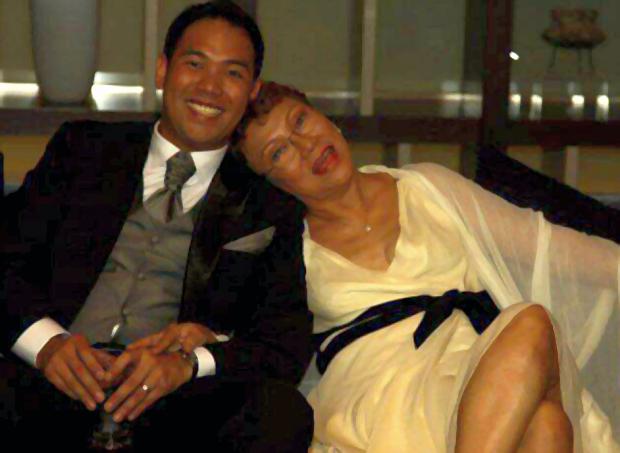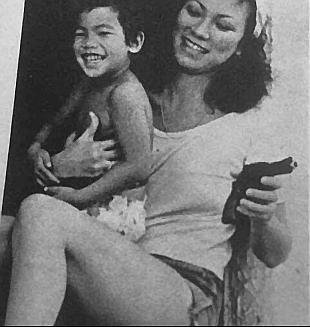Jacqui Magno’s son: Love is all there is

Krish Ramos with mother Jacqui Magno (Contributed photo)
MANILA, Philippines — In the mid-1970s, Filipino jazz singer Jacqui Magno was into spirituality and the Hare Krishna movement when she gave birth to a son she named Krishnamahal or Krish.
Krish Ramos, now 46, tells Inquirer that life with his mother was “the best, full of joy and adventure.”
Magno died June 21 of pancreatic cancer. She was 65.
Ramos, who was also a musician, having played drums with the band Elektrikoolaid, says that the most valuable thing he learned from his mom was: “Love is all there is.”
Indeed, Magno radiated love and joy through music, to which she gravitated as early as her college years in Maryknoll (now Miriam College) in Quezon City.
Article continues after this advertisementShe became a full-fledged professional singer with the Circus Band, which drew a big following in the early ’70s when it played regularly in the club circuit along Dewey Boulevard (now Roxas Boulevard) in Pasay.
Article continues after this advertisementAt the time, Circus Band had, aside from Magno, six other singers who would each achieve success as solo artists: Tillie Moreno, Pat Castillo, Basil Valdez, Hajji Alejandro, Richard Tan and Pabs Dadivas, with keyboardists Boy Katindig and Gerry Paraiso, lead guitarist Rudy Lozano, bassist Paco Gamboa, and drummer Walter Calinawan.

Jacqui Magno in her early days as a singer with Krish (Contributed photo)
In 1978, Serafin Pua, then 28 years old, pooled money with friends to open Birds of the Same Feather, a jazz club in Quezon City.
In an Inquirer article — “Jazz like the best of times,” published on Sept. 14, 2010 — Pua recalled he personally picked ex-Circus Band musicians who would comprise the band called Sticky, which would play at Birds’ opening night: Boy Katindig (keyboards), Rudy Lozano (guitar), Paco Gamboa (bass), and Jun Viray (drums).
“I wanted Jacqui Magno to sing with Sticky,” said Pua. “But she was then still performing at Calesa Bar. I told my partners: ‘We will open when she says yes.’ She did, and we hired her as a regular vocalist.”
Recording artist
As a recording artist, Magno released two solo albums: “Loving” (Orange House Records, Japan, 1979); and “Paglingon: Return of the Native” (Bookmark Audio, 2012).
Information on the website discogs.com shows that “Loving” is a compilation of eight tracks, of which two — “Vision of a Dance” and “After the Rain” — Magno recorded as singles on Jem Records.
“Paglingon,” produced by Magno’s Circus Band cohort, Pat Castillo, is a 12-track tribute to Filipino folk classics including “Bituing Marikit,” “Gaano Ko Ikaw Kamahal,” “Ang Tangi Kong Pag-ibig,” and “Hindi Kita Malimot.”
On both albums, one can hear Magno’s versatility — the ability to render various musical forms to suit her own identity. And that is why she was a jazz singer: Give her any song and she could jazz it up.
On YouTube, one can also find evidence of Magno’s talent: “Capture the Changes,” from the album “Tropical Jazz Fusion” featuring another Circus Band cohort, Boy Katindig on keyboards; “Laging Buhay ang Buhay,” which made it to the finals at the 2nd Metropop Music Festival; “One Note Samba,” a fuzzy clip from the TV show “Two For the Road,” with Bong Peñera on piano; among others.
The wake for Jacqui Magno started today, June 22, and will go on until June 23, at Arlington Memorial Chapels, 12 Gregorio Araneta Ave. Quezon City. Please omit flowers.
(Editor: Alexander T. Magno)